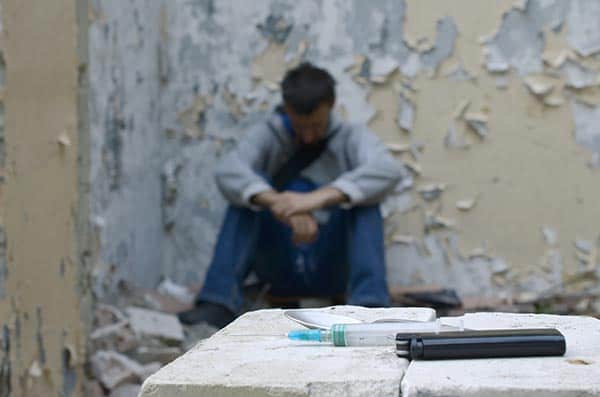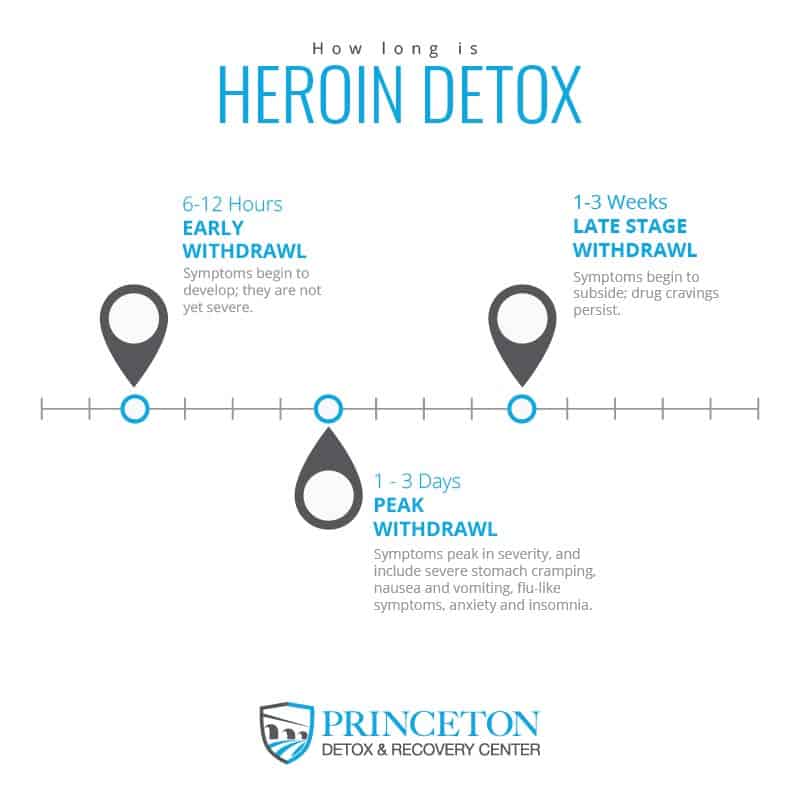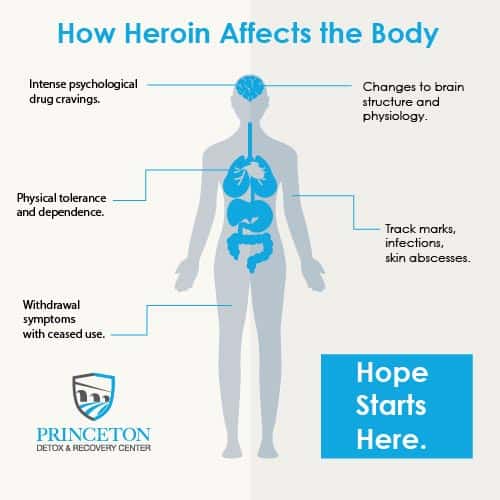Medically Monitored Heroin Detox
& Heroin Addiction Recovery
Heroin is an illegal narcotic opioid which has become extremely prevalent throughout the country over the course of the past two decades. According to the National Institute on Drug Abuse, roughly 948,000 Americans reported using heroin in 2016, and rates of heroin use have been on the rise since 2007. The majority of people who abuse heroin are between the ages of 18 and 25, though heroin addiction can occur regardless of age, personal background and demographic. Heroin is highly addictive, and even using the drug once or twice can lead to physical and psychological dependence.
In its purest form, heroin can be snorted or smoked. These methods of ingestion might appeal to some because they can avoid the stigma related to intravenous drug use. However, it is important to note heroin is addictive and dangerous regardless of whether it is snorted, smoked or injected. Dissolving the drug and injecting it directly into the bloodstream increases the risk of overdose-related death. The Centers for Disease Control and Prevention reports over 14,000 people lost their lives to heroin overdose in 2019. The CDC states, “The number of heroin-involved overdose deaths was more than seven times higher in 2019 than in 1999. Nearly a third of all opioid deaths involved heroin.” Because the purity of heroin varies so significantly, using the drug one time can result in a fatal overdose.
If you have been using heroin, there is help available, and recovery is always possible. At Princeton Detox & Recovery Center we specialize in treating the symptoms associated with heroin withdrawal while preparing each of our clients to take the next appropriate step on their personal recovery journeys. To learn more about our program of heroin addiction recovery or to ask additional questions about heroin use and dependence, contact us today.
How Does Heroin Affect the Body?
As soon as heroin enters the brain it rapidly binds to opioid receptors, causing an intense rush of euphoria. The rush a person experiences is often accompanied by a host of physical symptoms including dry mouth, nausea and vomiting, severe itching, a flushing of the skin and heaviness of the extremities. Once the initial effects of heroin wears off the person often feels drowsy, disoriented and mentally impaired for several hours. If a person uses a large amount of heroin at one time, neurochemical activity in the brain stem changes significantly causing respiratory depression (slowed and shallow breathing). The brain stem controls other vital functions like heart rate. Messages of pain which are typically transmitted through the spinal cord are blocked, and drug-taking behavior is reinforced by limbic system activity. Overall, heroin affects the physical body in a variety of ways as soon as it is taken.
There are also many long-term effects associated with heroin use. Repetitive heroin use changes the physical structure of the brain. These changes are not easily reversed, and the brain can only be returned to a healthy state of functioning with the maintenance of long-term sobriety. Repetitive use also leads to physical tolerance, meaning a larger amount is required in order for the desired “high” to be achieved. Once tolerance develops symptoms associated with withdrawal begin to take hold whenever a person attempts to cut back on the amount being taken or quit entirely. Physical and psychological dependence, and quitting without professional help becomes all but impossible.
We Are Here For You
Let Us Help You Heal
Our Drug & Alcohol detoxification experience is second to none.
Learn how we can help by speaking with one of our Treatment Advisors today.
What Are the Signs and Symptoms of Heroin Detox?
Heroin withdrawal is notoriously uncomfortable, though associated symptoms are rarely life-threatening. Still, seeking professional medical care from an inpatient detox center is always recommended. The most common symptoms associated with heroin detox include:
- Nausea, vomiting and diarrhea.
- Severe stomach cramping.
- Muscle aches and pains.
- General feelings of intense physical discomfort.
- Profuse sweating/night sweats.
- Uncontrollable shaking/body tremors.
- Extreme nervousness/anxiety and panic attacks.
- Intense and overwhelming heroin cravings.
- Depressed mood/suicidal ideation (in extreme cases).
- Agitation and irritability.
- Restlessness/an inability to sit still.
- Insomnia, nightmares and other sleep-related issues.
Heroin Detox Timeline
Heroin detox typically takes place in the following stages:
- 6-12 Hours – Early Withdrawal – Symptoms begin to develop; they are not yet severe.
- 1-3 Days – Peak Withdrawal – Symptoms peak in severity, and include severe stomach cramping, nausea and vomiting, flu-like symptoms, anxiety and insomnia.
- 1 Week – Late Stage Withdrawal – Symptoms begin to subside; drug cravings persist.
Does Heroin Show-Up on a Drug Test?
How long does heroin stay in the system? If you have been using heroin for a prolonged period of time, will it show up on a drug test? Heroin has a particularly short half-life, meaning half of the amount taken is flushed out of the system within as little as 30 minutes. The amount of time it takes heroin to leave the system depends on several factors like age, weight, body mass, rate of metabolism, the amount of heroin being taken and the purity of the drug. The Food and Drug Administration has approved several different types of drug tests — the presence of heroin can be detected through saliva, urine, blood and hair follicles. Saliva and blood tests are not often used, seeing as heroin is typically present in these two bodily fluids for less than 24 hours. Heroin can be detected in the urine for between 2 and 5 days, and hair follicles can show the presence of heroin in the system for up to 30 days.
Dangers of Using Heroin Frequently
There are many dangers which go hand-in-hand with using heroin frequently, one of the most significant being the development of a substance use disorder. Other dangers of using heroin frequently include:
- The development of a physical tolerance.
- Withdrawal symptoms when use is stopped abruptly.
- The development of certain psychiatric disorders.
- Physical issues depending on the method of ingestion (for example, skin infections and collapsed veins with intravenous use, and perforated nasal septum with intranasal use).
- Bacterial infections in the heart valves/heart disease.
- Contraction of blood-borne illnesses like hepatitis C and HIV.
- Financial and legal issues.
- Interpersonal problems/strained personal relationships.
- Overdose-related death.
Keep in mind — there is no way to “safely” use heroin. Because heroin is often combined with a variety of cutting agents (everything from talcum powder and laxatives to fentanyl, a synthetic opioid up to 100 times more potent than morphine), it is impossible to know exactly what you are putting into your body.
Ready To Begin Your Detox?
Don’t let addiction control your life.
Call us today and let’s get you started on the path to a better you.
How to Tell if You Are Becoming Addicted to Heroin
How can you tell if you are becoming addicted to heroin? Because heroin is illegal and highly addictive, using this drug just one time can easily put you at risk of addiction. The best idea is to stay away from this drug entirely. If you have used heroin more than once and you are concerned about developing a dependence, there are several signs and symptoms to keep an eye out for. It is important to remember addiction is a progressive condition. This means related symptoms continue to worsen in severity the longer they are left untreated.
Heroin Addiction Quiz
Ask yourself the following questions — if you answer “yes” to two or more, it is a good indication professional treatment has become necessary.
- Question #1: Do you often use heroin in larger amounts or over a longer period than you intended?
- Question #2: Have you wanted to cut back on heroin or made unsuccessful attempts to do so?
- Question #3: Do you spend a great deal of time finding, using or recovering from using?
- Question #4: Do you have strong urges or powerful cravings to use heroin?
- Question #5: Has your use of heroin resulted in your inability to meet your obligations at work, home, or school?
- Question #6: Have you had to cut back on or abandon social, professional, or recreational activities due to your use of heroin?
- Question #7: Have you repeatedly used heroin when it was hazardous to do so, such as while driving a car?
- Question #8: Have you experienced social or relationship problems due to your substance use and kept using anyway?
- Question #9: Have you kept using heroin knowing that it has caused or worsened physical or mental health issues?
- Question #10: When you attempt to cut back on or stop your use of heroin, have you experienced uncomfortable physical or mental health symptoms (withdrawal)?
- Question #11: Have you needed more heroin to feel the effects you’re seeking (tolerance)?
Treatment for Heroin Addiction
What is the most effective treatment option for heroin addiction? The answer to this question depends on the person who is asking it. However, the following stages of clinical care are almost always recommended:
Because addiction is not a one-size-fits-all medical condition, the most appropriate treatment options vary on a person-to-person basis. At Princeton Detox & Recovery Center we are happy to help you determine which level of care is the most appropriate for your unique case. Contact us today to learn more.

How to Find a Heroin Treatment Center
If you have been struggling with a heroin use disorder and you are ready to seek professional help, which steps should you take? Because the drug cravings associated with heroin are so intense and overwhelming and because the symptoms associated with heroin withdrawal can be so severe, we always recommend a short stay in an inpatient detox center. Many people who attempt to detox from heroin on their own return to use before the withdrawal process is over. Entering into a detox facility prevents relapse while providing a safe, pain-free heroin withdrawal. Because people who use heroin in any capacity often experience severe personal consequences, we recommend entering into residential inpatient treatment as soon as detox concludes. We work closely with several reputable treatment centers across the country, and we provide personalized aftercare planning and rehab placement services.
Contact Us to Learn More
If you have been using heroin in any capacity, Princeton Detox & Recovery Center is available to help. We treat heroin addiction at its roots, beginning with the thorough and effective treatment of heroin withdrawal symptoms. The moment you make the decision to reach out for help and contact us directly through our website or over the phone, you will be put in touch with one of our experienced Treatment Advisors. A Treatment Advisor will then walk you through our simple and straightforward admissions process. We begin with a brief pre-assessment which helps our clinical and medical team determine which detox methods are going to be the most beneficial for your unique case. We then offer a free, no obligation insurance benefit check and provide information on additional coverage options whenever necessary. Finally, we arrange local transportation to our New Jersey detox center. All you have to do is reach out for help, and we will take care of the rest. We look forward to speaking with you and answering any additional heroin addiction-related questions you might have.

Reviewed for accuracy by:
Amanda Hilzer M.Ed, CAADC, IADAC, ICCS, LCADC, CCS
Amanda graduated from Lehigh University with both an undergraduate degree in Psychology and a Master’s of Education degree in Counseling Psychology and has worked in the field of substance use disorder treatment and mental health treatment as a counselor and as a clinical manager for over 14 years.































